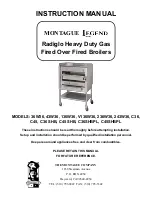
2
Part Number 550-142-320/0720
GWA
Series 3
Gas-Fired Water Boilers –
Boiler Manual
Read this first!
The boiler contains ceramic fiber and fiber-
glass materials. Use care when handling these
materials per instructions on page 52
of this
manual. Failure to comply could result in severe
personal injury.
When servicing boiler —
•
To avoid
electric shock, disconnect electrical supply
before performing maintenance.
• To avoid severe burns, allow boiler to cool before per-
forming maintenance.
Boiler operation —
•
Do not
block flow of combustion or ventilation air to
boiler.
• Should overheating occur or gas supply fail to shut off, do
not turn off or disconnect electrical supply to circulator.
Instead, shut off the gas supply at a location external
to the appliance.
• Do not use this boiler if any part has been under water.
Immediately call a qualified service technician to inspect
the boiler and to replace any part of the control system
and any gas control that has been under water.
Boiler water —
•
DO NOT
use petroleum-based cleaning or sealing com-
pounds in boiler system. Water seal deterioration will oc-
cur, causing leakage between boiler sections, circulator
flanges, diaphragm tanks or other system components.
This can result in substantial property damage.
• DO NOT use “homemade cures” or “boiler patent
medicines”. Serious damage to boiler, personnel and/
or property may result.
• Continual fresh makeup water will reduce boiler life.
Mineral buildup in sections reduces heat transfer, over-
heats cast iron, and causes section failure. Addition of
oxygen and other gases can cause internal corrosion.
Leaks in boiler or piping must be repaired at once to
prevent makeup water.
• Do not add cold water to hot boiler. Thermal shock can
cause sections to crack.
Glycol — potential fire hazard —
All glycol is flammable when exposed to high temperatures.
If glycol is allowed to accumulate in or around the boiler
or any other potential ignition source, a fire can develop.
In order to prevent potential severe personal injury, death
or substantial property damage from fire and/or structural
damage:
• Never
store glycol of any kind near the boiler or any
potential ignition source.
• Monitor and inspect the system and boiler regularly for
leakage. Repair any leaks immediately to prevent pos-
sible accumulation of glycol.
• Never use automotive antifreeze or ethylene glycol in
the system. Using these glycols can lead to hazardous
leakage of glycol in the boiler system.
If any part of a boiler, burner or its
controls has been sprayed with or
submerged under water, either partially
or fully, DO NOT attempt to operate
the boiler until the boiler has been ei-
ther replaced or completely repaired,
inspected, and you are sure that the
boiler and all components are in good
condition and fully reliable.
Otherwise,
by operating this boiler, you will cause a
fire or explosion hazard, and an electrical
shock hazard, leading to serious injury,
death, or substantial property damage.
Saltwater Damage
—
The exposure of boiler compo-
nents to saltwater can have both immediate and long-term
effects. While the immediate effects of saltwater damage
are similar to those of freshwater (shorting out of electrical
components, washing out of critical lubricants, etc.), the
salt and other contaminants left behind can lead to longer
term issues after the water is gone due to the conduc-
tive and corrosive nature of the salt residue. Therefore,
Williamson-Thermoflo equipment contaminated with salt-
water or polluted water will no longer be covered under
warranty and should be replaced.
Electrical Damage
—
If any
electrical component
or
wiring
came into contact with water, or was suspected
to have come into contact with water, replace the boiler
with a new Williamson-Thermoflo boiler.
Freeze protection fluids —
NEVER use automotive or standard glycol antifreeze. Use
only freeze-protection fluids made for hydronic systems.
Follow all guidelines given by the antifreeze manufacturer.
Thoroughly clean and flush any replacement boiler system
that has used glycol before installing the new boiler.
Frozen Water Damage Hazard
Residences or buildings that are unattended in severely
cold weather, boiler system components failures, power
outages, or other electrical system failures could result in
frozen plumbing and water damage in a matter of hours.
For your protection, take preventative actions such as
having a security system installed that operates during
power outages, senses low temperature, and initiates an
effective action. Consult with your boiler contractor or a
home security agency.
Failure to adhere to the guidelines on this page can result in severe personal
injury, death or substantial property damage.



































